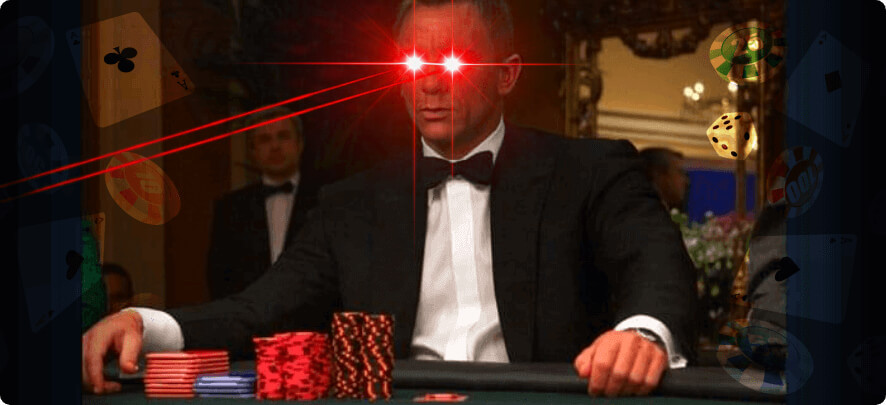In poker, what is a bad beat? The Truth Has Been Revealed

I’ve played millions of hands and have witnessed just about every possible outcome. This experience has made me acutely aware of the pains of a terrible poker beat. The fact that there is almost no such thing as an invulnerable hand is part of the game. The turn or river, on the other hand, can sometimes result in a significant change of fortunes for the players in the pot. Bad beats are caused by this unexpected outcome.
So, what constitutes a bad beat? When a player has a seemingly unbeatable poker hand and loses by the river, it is known as a terrible beat. The severity of a poor beat is usually proportional to how much money the unlucky poker player has lost. A terrible beat is a word that changes depending on the situation and the player.
Isn’t that all there is to it? Even yet, how the phrase “apparently unbeatable” is defined affects how the definition is understood.
True bad beats are uncommon
The term “bad beat” is, in my opinion, one of the most misunderstood in poker. In fact, I’m willing to bet that anyone who has played for a long period believes they’ve had hundreds, if not thousands, of terrible beats. I’ve got some bad news for you: they haven’t done so. In reality, you can play tens of thousands, if not a million, hands without taking a single poor beat. “OK, Mr. Smarty Pants, what is a true bad beat?” you might wonder. It’s actually quite straightforward.
What Exactly Is a Bad Beat in Poker?
When the strongest of the strong hands loses to an even stronger hand, that is a truly poor beat.
When it comes to terrible beats, there are a lot of myths floating around. Some people believe they got a bad beat every time they lose with a relatively solid hand, even if they were only a 2-1 favorite. If you’re one of these folks, you’re in for a lot of frustration and disappointment at poker.
A 2-1 favorite, such as the AKs versus 98o, is a large underdog to win three games in a row. In fact, there’s a one-in-three probability of it happening. Thus, no matter how attractive “Big Slick” appears, this example does not even come close to fitting the criteria of “apparently unbeatable.”
Other Situations That Aren’t Bad Enough to Be Called a Bad Beat
Let’s take it a step further and examine the “unbeatable” hand of the greatest of the powerful. Aren’t we all aware that a pair of Aces is the best starting hand in poker? When all-in pre-flop, it’s common knowledge that it will win roughly 85% of the time vs a random hand. Are there any surprises here? However, how frequently do you believe it will win three hands in a row going all-in preflop against a random hand? 70%? 80%? 80%? 80%? 80%? 80%? Nope. 61 percent is a good place to start. So, do you think you’re taking a big beat if you lose one out of every three times you go all-in with Aces during a session? The answer is once again no, and this time it’s not even close.
Now let’s pick an even greater favorite and put it to the test to see if it fits the severe conditions of our definition of a terrible beat. Let’s pretend we have an overpair in the river and our opponent has an underpair. He needs to hit a set on the river in order to win. How often do you think the underdog duo will win with only two outs? I won’t keep you waiting for the answer because you most likely already know. It’s a little less than 5%. Yes! Finally! Isn’t that right? To be honest, a 95 percent favorite appears to be unbeatable.
Not so fast, my friend. Let’s apply the same yardstick we used before to determine if our next contender for awful beatdom holds up. A 95% favorite will win three games in a row around 85% of the time. Hmmm… that’s really good, but it’s hardly unbeatable. Let me put it in context for you. At about the same rate that Aces lose when all-in pre-flop one time, a 95 percent favorite will lose at least one in three times. Is it unusual to lose with Aces? If you answered yes, you haven’t played a lot of poker.
After all of this research, we’ve narrowed it down to one final option: the rivered one on the outskirts. This, in my opinion, is the only “suck out” that appears to meet the criteria for rarity, as it occurs only approximately 2.3 percent of the time. Even still, 2.3 out of 100 isn’t unheard of. That’s about the same chance of a pro golfer making an eagle on a par 5 hole, which seems to happen frequently! Okay, I have a tendency to ramble, so bear with me. It’s not so much about losing to a 1 outer or 2 outer when it comes to bad beating.
Examples of Bad Beats in Poker
I’m not even talking about losing with flopped flushes or straights when it comes to poor beats. The following hands come to mind as contenders for truly terrible beats:
- Losing to quads in the top boat
- When you lose quads to a higher quad or a straight flush, it’s called a straight flush.
- Top set loses to runner-runner quads.
- With the bottom end of a straight flush, you’re out.
Let’s look at one of these specific cases to see if it meets the criteria for rarity:
Let’s pretend we’ve flopped a full house and the money is deposited in the river. We learn that our opponent has flopped quads, and the enormous pot is slid over to him. Ouch! This precise circumstance will occur once every 4324 years.
To put this in context, most people will never flop a full house 4000 times in their lives. I may be going out on a limb here, but I believe that’s a rare enough beat to be referred to as a terrible beat. Another example of a truly awful beat may be found here.
$1.00 BB No-Limit Hold’em (3 handed)
($100) BB
$$$$$$$$$$$$$$$$$$$$$
SB ($80.37) SB ($80.37) SB ($80.37) SB
Preflop: Button raises to $80.37 (All-In), SB bets $30.80 (All-In), 1 fold
($62.60) Flop: K, 2 and 5 (2 players, 2 all-in)
$62.60 ($62.60) $62.60 $62.60 $62.60 $62.60 (2 players, 2 all-in)
($62.60) River: 8 (2 players, 2 all-in)
$62.60 in the pot | $2 in the rake
Button had 8d, 8d, 8d, 8d, 8d, 8d, 8d, 8d, 8d (four of a kind, eights). SB had K, K, K, K, K, K, K, K, K, K (full house, kings over eights). Button won $60.60 in the end.
Notes: On the flop, the player in the small blind had 99.899 percent equity, but he still lost. That’s a terrible beat!
Relatively Bad Beats are an exception to the rule.
There are always exceptions to every rule, and terrible beats are no exception. The only time the rules can be significantly altered is when it comes to pots containing life-changing sums of money.
For example, if you’re on the verge of winning a major event and go all-in as an 85 percent favorite and lose, I’ll make an exception and term it a poor beat. But only if it costs you tens of thousands of dollars in advance. The restriction does not apply if the buy-in is less than.50. However, getting to heads-up in a high-stakes event and losing as an 85% favorite is not a poor beat. Even if you come in second place, you’ll still make a lot of money.
Of course, if it’s a winner-take-all competition, there’s an exception to this rule. The same logic holds true in cash games, where the amount of money at stake influences the severity of a bad beat. It’s theoretically a horrible beat to lose a $5 pot with four of a kind against a royal flush, but it doesn’t sting all that much. Losing a $10,000 pot to a rivered 4 outer, on the other hand, is a poor beat, but only because of the stakes.
What Is a Bad Beat Jackpot, and How Does It Work?
A poor beat jackpot is a prize awarded to a player who loses at showdown with a qualifying strong hand. The lowest qualifying hand varies for each poker room, however they all require the usage of two hole cards to produce both the losing and winning 5-card hands. Typically, the person who receives the poor beat receives the lion’s part of the award, with a portion of the prize split among the remaining players at the time. Furthermore, jackpots for bad beats are virtually usually progressive. To put it another way, the prize grows and grows until someone wins it. The award is then reset to the base jackpot, and the process begins again. The money for the prize comes from a percentage of the rake from the hands-on qualifying tables.
No one cares if you tell a bad beat story.
After losing in a very unexpected position, you may feel compelled to inform other players about the “injustice” you’ve experienced. My advice is to avoid talking about the bad things that have happened to you in the past at the poker table. After all, no one is interested in hearing about your awful beat. For the most part, most players regard it as a sort of whining as well as a lack of grasp of how poker works. Keep the tedious specifics of that bad beat to yourself unless you want to be called a sucker.
Recovering Mentally From a Bad Beat
Let me change gears now that I’ve spent so much time describing what a terrible beat is. In reality, there is no such thing as a bad beat when it comes to probabilities. This is especially true if you have played a large number of hands over your poker career. When you play games of chance, bad luck will ultimately strike.
My objective in this piece is to emphasize that everyone is exposed to the same amount of suckouts and, theoretically, will take the same number of poor beats throughout the course of their careers. This universality, from a theoretical sense, makes the long-term harmful effects of terrible beats unimportant. Finally, if you practice effective bankroll management and are aware that terrible beats do occur, you will be mentally and financially prepared to deal with them when improbable events occur at the poker table.
Don’t be a sucker, is the moral of the story. Remember that the next time you lose a big pot in an unusual event, the chances are on your side in the long run.

